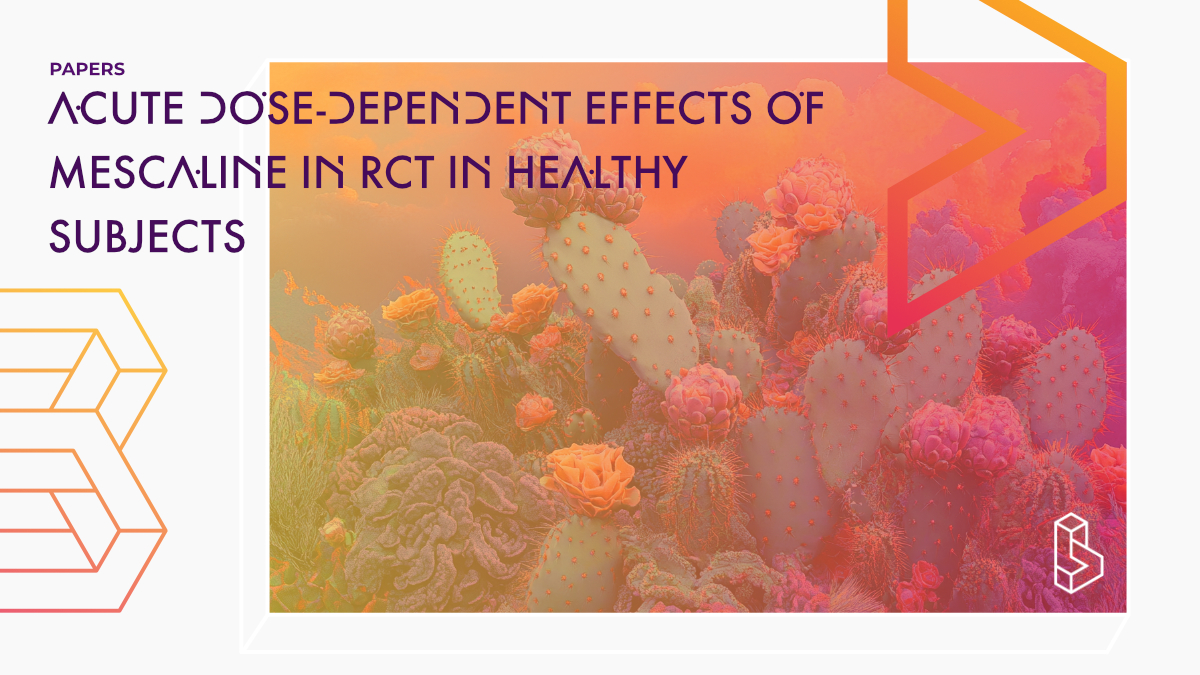This randomized, double-blind, placebo-controlled, crossover study (n=16) investigates the dose-dependent acute effects, pharmacokinetics, and mechanism of action of mescaline (100-800mg; 5x) in healthy subjects. It finds that mescaline induces dose-dependent subjective effects, increases blood pressure and heart rate, and has dose-proportional pharmacokinetics, with effects primarily mediated by 5-HT2A receptors as demonstrated by ketanserin co-administration.
Abstract of Acute dose-dependent effects of mescaline in a double-blind placebo-controlled study in healthy subjects
“Classic psychedelics have regained interest in research and therapy. Despite the long tradition of the human use of mescaline, modern data on its dose-dependent acute effects and pharmacokinetics are lacking. Additionally, its mechanism of action has not been investigated in humans. We used a randomized, double-blind, placebo-controlled, crossover design in 16 healthy subjects (8 women) who received placebo, mescaline (100, 200, 400, and 800 mg), and 800 mg mescaline together with the serotonin 5-hydroxytryptamine-2A (5-HT2A) receptor antagonist ketanserin (40 mg) to assess subjective effects, autonomic effects, adverse effects, and pharmacokinetics up to 30 h after drug administration. Mescaline at doses >100 mg induced dose-dependent acute subjective effects. Mescaline increased systolic and diastolic blood pressure at doses >100 mg, with no difference between doses of 200-800 mg. Heart rate increased dose-dependently. Pharmacokinetics of mescaline were dose-proportional. Maximal concentrations were reached after approximately 2 h, and the plasma elimination half-life was approximately 3.5 h. The average duration of subjective effects increased from 6.4 to 14 h with increasing doses of 100-800 mg mescaline. Nausea and emesis were frequent adverse effects at the 800 mg dose. Co-administration of ketanserin attenuated and shortened acute effects of 800 mg mescaline to become comparable to the 100 and 200 mg doses. There were no ceiling effects of the subjective response within the investigated dose range, but tolerability was lower at the highest doses. These results may assist with dose finding for future research and suggest that acute effects of mescaline are primarily mediated by 5-HT2A receptors.“
Authors: Aaron Klaiber, Yasmin Schmid, Anna M. Becker, Isabelle Straumann, Livio Erne, Alen Jelusic, Jan Thomann, Dino Luethi & Matthias E. Liechti
Summary of Acute dose-dependent effects of mescaline in a double-blind placebo-controlled study in healthy subjects
Mescaline, chemically known as 3,4,5-trimethoxyphenethylamine, is a serotonergic psychedelic with a long history of use in traditional medicine, particularly in North and South America. Unlike other well-known psychedelics like LSD, psilocybin, and DMT, which have been extensively researched in recent years, mescaline has not received the same modern clinical attention. Despite its use in cacti such as peyote and San Pedro for over 5,000 years, there is a lack of contemporary data on its dose-dependent effects, tolerability, and pharmacokinetics (how the body processes the drug).
Previous research has compared mescaline’s effects to other psychedelics, finding no major differences in subjective experiences. However, the detailed acute effects and mechanisms of mescaline remain understudied. It is known that the effects of other psychedelics are primarily mediated through the serotonin 5-hydroxytryptamine-2A (5-HT2A) receptor in the brain, but the role of these receptors in mescaline’s effects has not been thoroughly investigated.
This study aimed to fill this gap by exploring the acute dose-dependent effects of mescaline across a range of doses, as well as its pharmacokinetics and mechanism of action in healthy participants. The authors also investigated how the 5-HT2A receptor antagonist ketanserin influenced mescaline’s effects, providing insights into the receptor’s role in mediating the drug’s effects.
Methods and Materials
Study Design
Find this paper
https://doi.org/10.1038/s41398-024-03116-2
Open Access | Google Scholar | Backup | 🕊
Cite this paper (APA)
Klaiber, A., Schmid, Y., Becker, A.M. et al. Acute dose-dependent effects of mescaline in a double-blind placebo-controlled study in healthy subjects. Transl Psychiatry 14, 395 (2024). https://doi.org/10.1038/s41398-024-03116-2
Study details
Compounds studied
Mescaline
Topics studied
Healthy Subjects
Study characteristics
Original
Placebo-Controlled
Double-Blind
Within-Subject
Randomized
Bio/Neuro
Participants
16
Humans
Compound Details
The psychedelics given at which dose and how many times
Mescaline 100 - 800mg | 5x Placebo 40 mg | 1x
Linked Research Papers
Notable research papers that build on or are influenced by this paper
Safety pharmacology of acute mescaline administration in healthy participantsThis pooled analysis of two RCTs (n=48) investigates the safety of mescaline in single oral doses of 100–800 mg (96 administrations). Positive subjective effects increased dose-dependently, while autonomic effects were moderate. Adverse effects, including nausea (dose-limiting), were recorded, but no significant issues with liver/kidney function or blood cell counts occurred. "Flashbacks" were reported in 2% of administrations. Mescaline doses up to 800 mg were deemed safe in a controlled clinical setting for healthy participants.
Linked Clinical Trial
Role of the Serotonin 5-HT2A Receptor in Mescaline-induced Altered States of ConsciousnessThe present MDR-study will characterize the subjective effects of different doses of mescaline using modern psychometric instruments and examine the contribution of the 5-HT2A receptor in the mescaline-induced alterations of consciousness.

